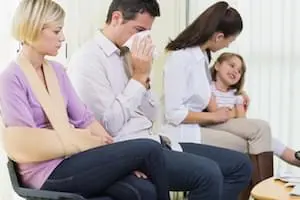Where Should You Go?

When to Choose Between the Emergency Room and Urgent Care
Medical emergencies can be stressful, especially when your primary care provider’s office is closed. Deciding between an emergency room (ER) and urgent care can be perplexing, as both settings address immediate health concerns. But understanding the fundamental differences can guide you to make the right choice.
Understanding the Basics
ERs are designed for higher acuity cases that demand immediate attention, including situations like trauma, severe chest pain, and stroke. They operate 24/7 and are equipped to handle potentially life-threatening emergencies.
On the other hand, urgent care centers address lower-severity health concerns. They’re ideal for situations that aren’t life-threatening but can't wait for a regular doctor’s appointment. Examples include ear infections, sinus issues, minor burns, and strains. Urgent care centers generally operate with limited hours compared to ERs.
Dr. Jeremy Parsons, a health expert from Adena Health System, emphasizes that while many opt for the ER due to its around-the-clock availability, urgent care provides a reliable alternative for less severe ailments. He points out that the ER’s extensive resources cater to serious conditions, leading to longer wait times due to prioritizing critical cases. Meanwhile, urgent care, focusing on basic care needs, can often wrap up visits in under an hour.
One of the reasons for the frequent ER visits for non-emergencies, Dr. Parsons notes, is convenience. People either don’t have a primary care provider, can’t see them promptly, or don’t want to wait.
FAQ on Emergency Rooms vs. Urgent Care
What differentiates an ER from Urgent Care?
ERs handle severe cases and life-threatening situations, whereas urgent care centers address non-critical emergencies.
Are Urgent Care centers open 24/7?
No, while ERs operate all hours, urgent care centers usually have limited operational times.
Can I undergo medical tests at both places?
Yes, but the range varies. ERs offer advanced tests like CT scans and MRIs, while urgent care covers basic tests like X-rays.
Which is more affordable for minor issues?
Urgent care typically has lower costs and insurance co-pays compared to ERs.
Can I get prescriptions in both facilities?
Yes, providers at both facilities can issue prescriptions, based on their discretion and your condition.
Why Choose Adena Urgent Care?
Adena Urgent Care stands out with its commitment to delivering timely, high-quality care. With six urgent care and same-day care facilities available, patients have the advantage of accessing medical services close to their home or workplace, seven days a week. Every Adena Urgent Care location is manned by our family-medicine-trained physicians and APPs. They provide top-tier care and are equipped to treat a wide variety of medical conditions.
Getting sick or injured may be unexpected and inconvenient, but seeking care at Adena Urgent Care always remains a convenient option. Find the nearest by clicking here!